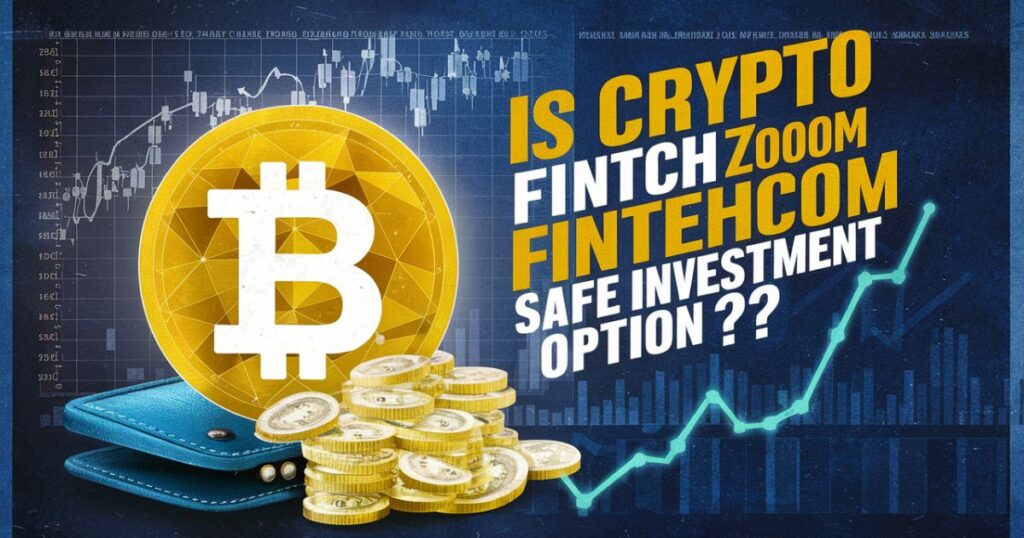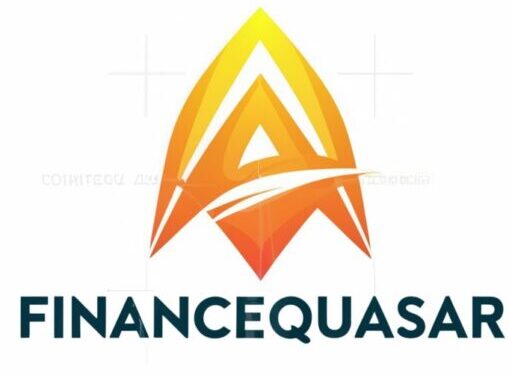What is Crypto FintechZoom?
Crypto FintechZoom represents the convergence of two revolutionary technologies: cryptocurrency and fintech (financial technology). This innovative field combines the decentralized nature of cryptocurrencies like Bitcoin and Ethereum with the disruptive power of fintech solutions, promising to revolutionize the way we think about money, banking, and investing.
Understanding the basics of cryptocurrency
Before diving into Crypto FintechZoom, it’s essential to grasp the fundamentals of cryptocurrencies. Cryptocurrencies are digital or virtual currencies that rely on blockchain technology, a decentralized and secure ledger system. Unlike traditional fiat currencies, cryptocurrencies operate independently of central banks or governments, enabling peer-to-peer transactions without intermediaries.
The first and most well-known cryptocurrency is Bitcoin, introduced in 2009 by the pseudonymous Satoshi Nakamoto. Since then, thousands of other cryptocurrencies, or “altcoins,” have emerged, each with its own unique features and use cases. Examples include Ethereum (focused on smart contracts and decentralized applications), Litecoin (designed for faster transaction times), and Ripple (aimed at facilitating cross-border payments).
The advantages of crypto fintech
Crypto FintechZoom offers several advantages over traditional financial systems:
- Increased accessibility and financial inclusion: By leveraging blockchain technology, crypto fintech solutions can provide access to financial services for unbanked and underbanked populations, promoting greater financial inclusion globally.
- Lower transaction costs and faster cross-border payments: Cryptocurrencies enable near-instant and borderless transactions with significantly lower fees compared to traditional banking systems, making them attractive for remittances and international payments.
- Enhanced security and transparency: The decentralized and immutable nature of blockchain technology provides enhanced security and transparency, reducing the risk of fraud, corruption, and data manipulation.
- Innovation and disruption: Crypto fintech has the potential to disrupt various aspects of the financial industry, from lending and borrowing to asset management and investment, by introducing new and innovative models.
The role of blockchain technology in crypto fintech

Blockchain technology is the backbone of cryptocurrencies and a crucial component of Crypto FintechZoom. A blockchain is a distributed, decentralized ledger that records transactions in a secure and transparent manner. Each block in the chain contains a collection of transactions, and once a block is added to the chain, it becomes virtually impossible to alter or remove it, ensuring data integrity and immutability.
Smart contracts, self-executing contracts with the terms of the agreement directly written into code, are another key feature of blockchain technology. Smart contracts enable the automation of various financial processes, reducing the need for intermediaries and increasing efficiency.
Current trends in crypto fintech
The crypto fintech industry is rapidly evolving, with several notable trends emerging:
- Rise of decentralized finance (DeFi) platforms: DeFi platforms aim to recreate traditional financial services, such as lending, borrowing, and trading, in a decentralized and permissionless manner, leveraging blockchain technology and smart contracts.
- Crypto lending and borrowing services: Platforms like Aave, Compound, and Maker allow users to lend or borrow cryptocurrencies, earning interest or accessing liquidity without going through traditional financial institutions.
- Non-fungible tokens (NFTs) and their applications: NFTs are unique digital assets that represent ownership of items such as art, collectibles, and even real estate on the blockchain. They have gained significant traction in recent years, creating new opportunities for asset tokenization and investment.
Challenges and risks in the crypto fintech industry
While Crypto FintechZoom offers numerous benefits, it also presents several challenges and risks that must be addressed:
- Volatility of cryptocurrency markets: Cryptocurrency markets are known for their high volatility, with prices often fluctuating rapidly due to factors such as speculation, news, and regulatory changes. This volatility can pose risks for investors and businesses operating in the crypto fintech space.
- Regulatory uncertainties and legal complexities: The regulatory landscape surrounding cryptocurrencies and crypto fintech is still evolving, with varying laws and regulations across different jurisdictions. This lack of clarity can create legal complexities and compliance challenges for companies in the industry.
- Cybersecurity threats and potential for hacks: As with any digital asset, cryptocurrencies and crypto fintech platforms are vulnerable to cyber attacks, hacking attempts, and other security breaches. Robust security measures and best practices are crucial to mitigate these risks.
Regulations and legal considerations in crypto fintech
Governments and regulatory bodies around the world are grappling with the challenge of regulating the crypto fintech industry. While some countries have established regulatory frameworks, others are still in the process of developing appropriate laws and guidelines.
Key regulatory considerations in crypto fintech include:
- Anti-money laundering (AML) and know-your-customer (KYC) requirements: Crypto fintech companies must comply with AML and KYC regulations to prevent money laundering and financial crimes.
- Consumer protection: Ensuring adequate consumer protection measures, such as transparency in disclosures and investor education, is crucial for maintaining trust and confidence in the crypto fintech ecosystem.
- Taxation: Governments are exploring ways to tax cryptocurrency transactions and income, with varying approaches across different jurisdictions.
- Securities regulations: Certain cryptocurrency offerings and tokenized assets may be classified as securities, subjecting them to relevant securities laws and regulations.
Initiatives are underway to establish global standards and best practices for crypto fintech regulation, aiming to strike a balance between fostering innovation and managing risks.
Investing in crypto fintech: Opportunities and strategies
The crypto fintech industry presents numerous investment opportunities, ranging from cryptocurrencies and tokens to equity investments in crypto fintech companies. However, investing in this space requires due diligence, research, and a thorough understanding of the associated risks.
Potential investment options in crypto fintech include:
- Cryptocurrencies and tokens: Investors can directly purchase and hold cryptocurrencies like Bitcoin, Ethereum, or other altcoins, as well as tokens associated with specific crypto fintech projects or platforms.
- Initial Coin Offerings (ICOs) and Security Token Offerings (STOs): These are crowdfunding mechanisms used by crypto fintech companies to raise capital by issuing digital tokens or securities on the blockchain.
- Crypto investment funds: Several investment funds specializing in cryptocurrencies and crypto fintech assets have emerged, offering diversified exposure to the industry.
- Equity investments: Investors can also consider equity investments in crypto fintech startups and established companies through traditional venture capital or public markets.
Effective investment strategies in crypto fintech often emphasize portfolio diversification, risk management, and conducting thorough due diligence on projects, teams, and underlying technologies.
The future of crypto fintech: Predictions and potential developments

The future of Crypto FintechZoom is brimming with exciting possibilities and potential developments:
- Integration with traditional financial systems: As crypto fintech solutions mature and gain mainstream adoption, we may witness greater integration with traditional financial systems, enabling seamless interoperability between traditional and decentralized finance.
- Adoption by mainstream institutions and corporations: Major financial institutions, corporations, and even governments are exploring the use of blockchain technology and cryptocurrencies, potentially leading to broader adoption and legitimization of crypto fintech.
- Emerging technologies and their impact: The convergence of crypto fintech with emerging technologies such as artificial intelligence (AI), the Internet of Things (IoT), and Web3 could unlock new and innovative use cases, further disrupting the financial sector.
- Central Bank Digital Currencies (CBDCs): Several central banks around the world are exploring the development of their own digital currencies, which could potentially leverage blockchain technology and influence the future of crypto fintech.
As the crypto fintech industry continues to evolve, we can expect ongoing innovation, disruption, and the potential for transformative changes in the way we perceive and interact with financial services.
Risks Associated with Crypto FintechZoom
While Crypto FintechZoom offers numerous opportunities, it is essential to understand and mitigate the associated risks. Here are some of the major risks to consider:
Highly Volatile
One of the most significant risks in the crypto fintech space is the high volatility of cryptocurrency markets. Cryptocurrency prices are known to fluctuate rapidly due to various factors, including speculation, news events, regulatory changes, and market sentiment.
This volatility can pose challenges for businesses and investors operating in the crypto fintech industry. For example, a sudden price drop could significantly impact the value of cryptocurrency holdings or the liquidity of lending platforms.
To mitigate this risk, it is crucial to adopt a diversified investment strategy, implement robust risk management practices, and closely monitor market conditions.
Hacking Risk
Cryptocurrencies and crypto fintech platforms are digital assets and systems, making them vulnerable to cyber attacks and hacking attempts. Hackers may target cryptocurrency exchanges, wallets, or other platforms in an effort to steal funds or disrupt operations.
Notable examples of hacking incidents in the crypto fintech industry include the Mt. Gox hack in 2014, where the then-largest Bitcoin exchange lost over 850,000 BTC, and the DAO hack in 2016, where an Ethereum-based decentralized autonomous organization (DAO) was exploited, resulting in the loss of millions of dollars worth of Ether.
To reduce the risk of hacking, it is essential for crypto fintech companies and users to implement robust security measures, such as multi-factor authentication, cold storage solutions, and regular security audits.
Technical Risks
Crypto fintech relies on complex and rapidly evolving technologies, such as blockchain and smart contracts. While these technologies offer numerous benefits, they also introduce technical risks that must be carefully managed.
One potential risk is the issue of scalability and network congestion. As the adoption of cryptocurrencies and blockchain-based applications increases, the underlying networks may face challenges in handling the increased transaction volume, leading to slower transaction times and higher fees.
Additionally, compatibility challenges may arise when integrating crypto fintech solutions with legacy systems or when different blockchain networks need to interact with each other.
To mitigate these risks, ongoing research and development efforts are underway to address scalability issues, improve interoperability, and enhance the overall performance and reliability of crypto fintech technologies.
Regulatory Risks
The regulatory landscape surrounding cryptocurrencies and crypto fintech is still evolving, with varying regulations across different jurisdictions. This lack of clarity and regulatory uncertainty poses significant risks for businesses operating in the industry.
Potential regulatory risks include:
- Restrictive policies or outright bans: Some countries have implemented strict regulations or outright bans on certain aspects of cryptocurrency and crypto fintech, which can significantly impact operations and market access.
- Compliance challenges: Navigating the complex and constantly changing regulatory landscape can be challenging for crypto fintech companies, potentially leading to compliance issues and legal consequences.
- Lack of regulatory clarity: The absence of clear and consistent regulations can create uncertainty, hindering innovation and adoption in the crypto fintech space.
To manage regulatory risks, it is crucial for crypto fintech companies to stay informed about regulatory developments, actively engage with policymakers and regulatory bodies, and prioritize compliance with relevant laws and guidelines.
Related Post: FintechZoom Apple Stock: A Comprehensive Investor’s Guide
Is Crypto FintechZoom a Safe Investment Option?

The question of whether Crypto FintechZoom is a safe investment option is a complex one, as it depends on various factors. Here are some key considerations:
Market Reputation
When evaluating the safety of investing in a particular crypto fintech project or asset, it is essential to consider its market reputation. This includes assessing the track record of the project, the credibility of the development team, and the overall community sentiment and adoption rates.
Projects with a strong reputation, transparent operations, and a dedicated community are generally considered safer investments compared to those with a lack of credibility or a history of controversies.
Transparency in Disclosures
Transparency is crucial in the crypto fintech industry, as it helps build trust and confidence among investors and users. Reputable projects often provide detailed documentation, audited code, and regular security assessments, enabling investors to make informed decisions.
Additionally, the open-source nature of many crypto fintech projects allows for greater transparency and scrutiny by the community, further enhancing trust and reducing the risk of potential issues or vulnerabilities.
Security Measures
The safety of investing in crypto fintech is closely tied to the security measures implemented by projects and platforms. Robust security practices, such as multi-factor authentication, secure protocols, and cold storage solutions for digital assets, can significantly reduce the risk of hacking, theft, or other security breaches.
Furthermore, having contingency plans and comprehensive security audits in place can help mitigate the impact of potential security incidents and instill confidence in investors.
Compliance with Regulatory Frameworks
As the regulatory landscape surrounding crypto fintech continues to evolve, it is crucial for projects and platforms to adhere to relevant financial regulations, such as know-your-customer (KYC) and anti-money laundering (AML) requirements.
Compliance with regulatory frameworks not only ensures legal operations but also demonstrates a commitment to best practices and consumer protection, which can contribute to the perception of safety among investors.
Proactive engagement with regulatory bodies and the ability to adapt to changing regulations can further enhance the safety and credibility of crypto fintech investments.
While investing in Crypto FintechZoom carries inherent risks, projects and platforms that prioritize market reputation, transparency, security, and regulatory compliance are generally considered safer investment options within the industry.
Essential Tools for Managing Crypto FintechZoom
To navigate the complex world of Crypto FintechZoom effectively, investors and users should leverage various tools and resources. Here are some essential tools for managing your crypto fintech portfolio and staying informed:
Portfolio Tracker
A portfolio tracker is a crucial tool for monitoring and analyzing your cryptocurrency investments. These tools typically provide real-time price updates, market data, and portfolio performance metrics, allowing you to make informed decisions about buying, selling, or rebalancing your holdings.
Popular portfolio tracking apps and websites include CoinTracker, Delta, and CoinStats, among others. Many of these tools also offer tax reporting and portfolio management features, making it easier to stay compliant with relevant regulations.
Wallet
A cryptocurrency wallet is a digital storage solution that secures your digital assets, such as cryptocurrencies and tokens. Wallets come in various forms, including hot wallets (connected to the internet) and cold wallets (offline storage devices).
Popular wallets include MetaMask (for Ethereum-based assets), Ledger (hardware wallet), and Trust Wallet (mobile wallet supporting multiple cryptocurrencies). When choosing a wallet, it is essential to consider factors such as security features, user-friendliness, and compatibility with the cryptocurrencies you hold.
Aggregator for News Updates
Staying informed about the latest developments in the crypto fintech industry is crucial for making well-informed investment decisions and keeping up with emerging trends. News aggregators and curated news feeds can help you stay up-to-date with the most relevant and reputable sources.
Platforms like CoinDesk, CryptoSlate, and CoinTelegraph offer comprehensive coverage of crypto fintech news, analysis, and market updates. Additionally, social media channels and community forums can provide valuable insights and discussions on the latest industry developments.
Security Tools
Given the potential security risks associated with crypto fintech, it is essential to utilize robust security tools and best practices. Hardware wallets, which store private keys in a secure, offline environment, are considered one of the safest options for storing digital assets.
Other security tools include password managers, encryption software, antivirus solutions, and virtual private networks (VPNs). Implementing multi-factor authentication and regularly updating software and security protocols can further enhance the security of your crypto fintech assets and activities.
By leveraging these essential tools, you can effectively manage your crypto fintech portfolio, stay informed about industry developments, and prioritize the security of your digital assets.
The Rise of Crypto FintechZoom
Crypto FintechZoom is rapidly gaining momentum as a disruptive force in the financial industry, offering innovative solutions and challenging traditional models. Here’s an overview of the key components and drivers behind the rise of Crypto FintechZoom:
Key Components of Crypto FintechZoom
The Crypto FintechZoom ecosystem encompasses a wide range of components, including:
- Digital wallets and payment platforms: These solutions facilitate peer-to-peer transactions, remittances, and integration with e-commerce platforms and point-of-sale systems, enabling seamless cryptocurrency payments.
- Decentralized finance (DeFi) protocols: DeFi platforms and protocols enable lending, borrowing, trading, and various other financial services without the need for intermediaries, leveraging blockchain technology and smart contracts.
- Asset management and investment solutions: Crypto fintech offers innovative investment products, such as tokenized assets (representing ownership of real-world assets like real estate or art), crypto-based investment funds, and derivative products like options and futures.
- Regulatory tech (RegTech) and compliance tools: As regulations evolve, RegTech solutions help crypto fintech companies navigate compliance requirements, facilitate know-your-customer (KYC) processes, and ensure adherence to anti-money laundering (AML) regulations.
Digital Wallets and Payment Platforms
Digital wallets and payment platforms are among the most visible and widely adopted applications of Crypto FintechZoom. These solutions facilitate secure storage, sending, and receiving of cryptocurrencies, enabling seamless peer-to-peer transactions and remittances without the need for intermediaries like banks or money transfer services.
Key Features and Benefits
Digital wallets and payment platforms offer several key features and benefits:
- Secure Storage: Wallets provide a secure environment for storing cryptocurrencies and private keys, protecting users’ digital assets from theft or unauthorized access.
- Ease of Use: User-friendly interfaces and mobile apps make it easy for users to manage their cryptocurrency holdings, send and receive payments, and monitor transaction history.
- Low Transaction Fees: Cryptocurrency transactions typically have lower fees compared to traditional payment methods, making digital wallets and payment platforms attractive for cross-border payments and remittances.
- Accessibility and Financial Inclusion: By eliminating the need for a traditional bank account, digital wallets and payment platforms can provide access to financial services for unbanked and underbanked populations, promoting greater financial inclusion globally.
- Integration with E-commerce and Point-of-Sale Systems: Many digital wallets and payment platforms offer integration with e-commerce platforms and point-of-sale systems, enabling merchants to accept cryptocurrency payments seamlessly.
Popular Digital Wallets and Payment Platforms
The digital wallet and payment platform ecosystem is diverse, with a range of solutions catering to different cryptocurrencies, user preferences, and security needs. Here are some popular examples:
- MetaMask: A popular browser extension and mobile wallet for Ethereum-based cryptocurrencies and tokens, enabling users to interact with decentralized applications (dApps) and participate in the Ethereum ecosystem.
- Coinbase Wallet: Offered by the leading cryptocurrency exchange Coinbase, this wallet supports a wide range of cryptocurrencies and provides a user-friendly interface for managing digital assets.
- Trust Wallet: A mobile wallet that supports multiple cryptocurrencies and blockchain networks, known for its intuitive interface and integration with decentralized applications (dApps).
- Ledger: A hardware wallet that provides offline cold storage for cryptocurrencies, offering enhanced security by storing private keys in a secure, offline environment.
- BitPay: A leading cryptocurrency payment service provider, enabling merchants to accept Bitcoin and other cryptocurrencies as payment, with seamless integration into their existing payment systems.
Decentralized Finance (DeFi)
Decentralized Finance (DeFi) is a rapidly growing segment of Crypto FintechZoom, aiming to recreate traditional financial services in a decentralized and permissionless manner. DeFi protocols and platforms leverage blockchain technology and smart contracts to enable lending, borrowing, trading, and other financial activities without the involvement of intermediaries like banks or brokers.
Some key components of the DeFi ecosystem include:
- Lending and borrowing platforms: Platforms like Aave, Compound, and Maker allow users to lend their cryptocurrencies and earn interest or to borrow funds by providing collateral in the form of cryptocurrencies.
- Decentralized exchanges (DEXs): DEXs, such as Uniswap, SushiSwap, and PancakeSwap, enable peer-to-peer trading of cryptocurrencies and tokens without the need for a centralized exchange.
- Automated market makers (AMMs): AMMs, like Uniswap and Curve, facilitate liquidity provision and enable efficient trading by utilizing mathematical formulas to determine prices and execute trades.
- Yield farming and liquidity mining: These DeFi strategies involve providing liquidity to lending pools or DEXs in exchange for rewards or interest, allowing users to earn passive income on their cryptocurrency holdings.
The DeFi ecosystem is rapidly evolving, with new protocols and innovative solutions emerging regularly, offering users greater control, transparency, and access to financial services.
Asset Management and Investment
Crypto FintechZoom is also transforming the asset management and investment landscape by introducing innovative products and services. One of the most significant developments is the tokenization of traditional assets, such as real estate, art, and other physical assets, through the use of non-fungible tokens (NFTs) or security tokens.
Tokenization enables fractional ownership, increased liquidity, and easier trading of these assets on blockchain-based platforms. Additionally, crypto-based investment funds and trading platforms offer investors exposure to a diversified portfolio of cryptocurrencies and crypto-related assets.
Furthermore, the crypto fintech industry is exploring innovative investment products like options, futures, and derivatives based on cryptocurrencies, providing investors with additional tools for hedging and speculating.
The Challenges Facing Crypto FintechZoom
Despite its immense potential, Crypto FintechZoom faces several challenges that must be addressed for widespread adoption and sustainability:
- Scalability and performance limitations: While blockchain technology offers several advantages, its current scalability and performance limitations can hinder the mass adoption of certain crypto fintech solutions, particularly those requiring high transaction volumes or low latency.
- Interoperability issues: With multiple blockchain networks and protocols in existence, interoperability challenges arise when different blockchain ecosystems need to interact or exchange information.
- User experience and adoption barriers: The complexities of blockchain technology and cryptocurrencies can create user experience challenges and adoption barriers, particularly for less technically-savvy users.
- Regulatory uncertainties: The lack of clear and consistent regulations across jurisdictions can create uncertainty and compliance challenges for crypto fintech companies, potentially hindering innovation and adoption.
Ongoing research, development, and collaboration within the crypto fintech community are focused on addressing these challenges and paving the way for broader adoption and integration with traditional financial systems.
The Future of Crypto FintechZoom
The future of Crypto FintechZoom holds immense promise, with the potential for mainstream adoption and integration with traditional financial institutions. As the technology matures and regulatory frameworks evolve, we may witness:
- Collaboration and partnerships: Traditional financial institutions may increasingly collaborate with or acquire crypto fintech companies, leveraging their innovative solutions and expertise to enhance their offerings and remain competitive.
- Emergence of new use cases: Beyond the current applications in payments, lending, and investing, Crypto FintechZoom may enable new use cases in areas like supply chain finance, trade finance, and central bank digital currencies (CBDCs).
- Increased institutional adoption: As the regulatory landscape becomes clearer and the perceived risks diminish, institutional investors and corporations may increasingly allocate funds to cryptocurrencies and crypto fintech solutions, driving further adoption and legitimacy.
- Integration with emerging technologies: The convergence of Crypto FintechZoom with other emerging technologies, such as artificial intelligence (AI), Internet of Things (IoT), and 5G, could unlock new and innovative applications, further disrupting the financial sector.
While challenges remain, the potential of Crypto FintechZoom to revolutionize finance and promote financial inclusion on a global scale is undeniable. As the industry continues to evolve, we can expect ongoing innovation, disruption, and the potential for transformative changes in the way we perceive and interact with financial services.
Crypto FintechZoom Insights Navigating the Future of Financial Technology

The rise of Crypto FintechZoom is part of a broader transformation in the financial technology landscape, driven by the rapid pace of innovation and changing consumer expectations. In this section, we’ll explore insights into navigating the future of financial technology, including the impact of fintech on traditional banking, key players in the industry, and future predictions and opportunities for growth.
The Rise of Cryptocurrency
The emergence of cryptocurrencies like Bitcoin and Ethereum has been a pivotal moment in the evolution of financial technology. These decentralized digital currencies, built on blockchain technology, have challenged traditional notions of money, transactions, and financial systems.
Cryptocurrencies offer several advantages over traditional fiat currencies, including:
- Decentralization: Cryptocurrencies operate independently of central banks or governments, enabling peer-to-peer transactions without intermediaries.
- Transparency and security: Blockchain technology provides a transparent and secure ledger system, reducing the risk of fraud and corruption.
- Lower transaction costs: Cryptocurrency transactions typically have lower fees compared to traditional banking systems, making them attractive for cross-border payments and remittances.
- Financial inclusion: Cryptocurrencies can provide access to financial services for unbanked and underbanked populations, promoting greater financial inclusion globally.
While cryptocurrencies have faced regulatory challenges and volatility, their disruptive potential and increasing adoption by mainstream institutions and corporations suggest that they are here to stay and will continue to shape the future of financial technology.
Impact of Fintech on Traditional Banking
The rise of fintech has disrupted traditional banking models, forcing legacy financial institutions to adapt and innovate. The impact of fintech on traditional banking can be seen in several areas:
- Digital transformation: Banks are investing heavily in digital technologies, such as mobile banking apps, online lending platforms, and digital wallets, to meet evolving customer expectations and compete with fintech startups.
- Partnerships and acquisitions: Many banks are partnering with or acquiring fintech companies to leverage their innovative solutions and expertise, rather than attempting to build everything in-house.
- Increased competition: Fintech startups are challenging traditional banks in areas like lending, payments, and investment management, offering faster, more convenient, and often cheaper services.
- Regulatory changes: Regulators are adapting to the fintech landscape, introducing new regulations and guidelines to promote innovation while ensuring consumer protection and financial stability.
While the disruption caused by fintech has been disruptive for traditional banks, it has also created opportunities for collaboration, innovation, and the development of new business models that better serve evolving customer needs.
Key Players in the Fintech Industry
The fintech industry is a diverse and rapidly evolving ecosystem, with numerous players contributing to its growth and innovation. Here are some of the key players shaping the fintech landscape:
- Fintech startups: Innovative startups like Stripe, Robinhood, and Klarna are challenging traditional financial services with their disruptive solutions in areas like payments, investing, and lending.
- Established tech giants: Companies like Apple, Google, Amazon, and Meta (Facebook) are leveraging their vast resources and user bases to offer fintech solutions, such as digital wallets, peer-to-peer payments, and buy-now-pay-later services.
- Traditional financial institutions: Banks, insurance companies, and other legacy financial institutions are increasingly embracing fintech solutions through partnerships, acquisitions, and in-house innovation efforts.
- Venture capital firms: Venture capitalists and investment firms play a crucial role in funding and supporting the growth of promising fintech startups and initiatives.
- Regulatory bodies and policymakers: Government agencies, central banks, and international organizations are shaping the regulatory landscape for fintech, influencing its development and adoption.
The interplay and collaboration among these key players are driving innovation, shaping consumer experiences, and redefining the financial services industry.
Future Predictions and Opportunities for Growth
The future of fintech is brimming with exciting possibilities and opportunities for growth. Here are some predictions and areas of potential development:
- Integration of emerging technologies: The convergence of fintech with emerging technologies like artificial intelligence (AI), machine learning, Internet of Things (IoT), and 5G will enable new and innovative solutions, such as personalized financial services, predictive analytics, and real-time fraud detection.
- Expansion of digital identity and data privacy solutions: As digital financial services become more prevalent, there will be a growing need for robust digital identity and data privacy solutions to protect consumers and ensure secure transactions.
- Fintech for underserved markets: Fintech solutions have the potential to promote financial inclusion by providing access to financial services for underserved populations, such as those in rural areas or developing countries.
- Rise of embedded finance: Fintech solutions may increasingly be embedded within non-financial products and services, such as e-commerce platforms, ride-sharing apps, and social media platforms, creating seamless and integrated financial experiences.
- Regulatory innovation: Regulators may explore innovative approaches to fintech regulation, such as regulatory sandboxes, to foster innovation while maintaining consumer protection and financial stability.
- Increased collaboration and partnerships: We may witness more collaboration and partnerships between fintech startups, traditional financial institutions, and tech giants, leveraging each other’s strengths and expertise to provide comprehensive financial solutions.
As the fintech industry continues to evolve and disrupt traditional financial services, there will be ample opportunities for growth, innovation, and the development of solutions that better serve the evolving needs of consumers and businesses alike.
Challenges and Risks in the Fintech Landscape
While the fintech industry presents numerous opportunities, it is also important to acknowledge and address the challenges and risks associated with this rapidly evolving landscape:
- Cybersecurity threats: The increasing digitization of financial services and the reliance on technology make fintech solutions vulnerable to cyber attacks, data breaches, and other security threats, highlighting the need for robust cybersecurity measures and risk management practices.
- Regulatory uncertainties and compliance challenges: The lack of clear and consistent regulations across jurisdictions can create uncertainties and compliance challenges for fintech companies, potentially hindering innovation and adoption.
- Competition and disruption: The fintech industry is highly competitive, with traditional players, startups, and tech giants vying for market share. This intense competition can lead to disruption and the potential displacement of legacy financial services providers.
- Data privacy and consumer protection concerns: As fintech solutions handle sensitive financial data and personal information, ensuring data privacy and consumer protection is crucial to maintaining trust and confidence in the industry.
- Talent acquisition and retention: The fintech industry requires a skilled workforce with expertise in areas like technology, finance, and data analytics. Attracting and retaining top talent can be a challenge for fintech companies.
- Scalability and integration challenges: As fintech solutions gain traction, scalability and integration with legacy systems and infrastructure may pose challenges, requiring careful planning and execution.
By proactively addressing these challenges and risks, the fintech industry can continue to innovate and thrive while maintaining consumer trust, regulatory compliance, and long-term sustainability.
Conclusion
The world of Crypto FintechZoom and the broader fintech landscape are rapidly evolving, presenting both immense opportunities and complex challenges. As we navigate this exciting frontier, it is crucial to embrace innovation while prioritizing security, transparency, and regulatory compliance. By leveraging the power of emerging technologies, fostering collaboration among key players, and addressing potential risks, we can unlock the full potential of Crypto FintechZoom and shape a more inclusive, efficient, and transformative financial future.
Meet James John, the luminary mind behind FinanceQuasar. With a passion for demystifying finance, James is a seasoned expert dedicated to simplifying complex concepts. His insightful articles illuminate the financial cosmos, guiding readers towards prosperity. Join James on this enlightening journey, as he shares his wealth of knowledge and expertise.







